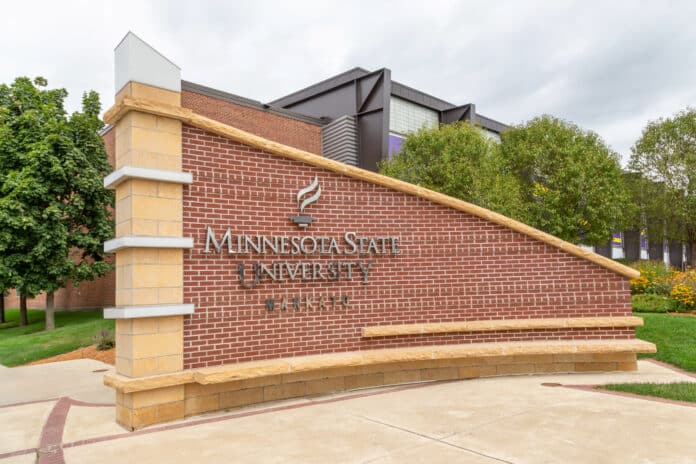
State law and the Minnesota State Colleges and Universities system forces students to pay fees tacked onto their college credits to bankroll a far-left organization that claims to speak on behalf of all students across the state of Minnesota.
The Minnesota State Board of Trustees requires each student attending a state university to be a member of and pay dues to Students United — an association created for the purpose of engaging in political speech, which advocates for and takes positions on controversial policies and legislation, and which claims to speak on all students’ behalf.
For example, Students United supports the state’s biennial budget request and publishes a website, “Fck Student Debt,” which advocates for the abolition of student loan debt.
Students United also supported the passage into law of two years of tuition-free college for Minnesota students. According to its August 2022 board meeting, which began with a so-called “land acknowledgment” that Minnesota’s state colleges and universities are purportedly situated on “the land of the Oceti Sakowin and Anishinaabe People,” Students United advocates for things like “Menstrual Equity” and “Equity 2030.” Equity 2030 is described as an “anti-racist” “organizing principle” that seeks “to close” purported “educational equity gaps across race and ethnicity.”
Likewise, Students United features a page of resources related to “Black Lives Matter.”
In a June 5, 2020 letter to the Minnesota State presidents, Students United demanded a redesign of all campus public safety offices to “center compassion, harm and violence reduction, equity, intervention, and restorative justice,” called for “widespread education, curriculum, and training for all faculty, students, and staff designed to elevate a comprehensive understanding of history, the way racism and discrimination exist and present themselves now, and resisting bias,” and called for affirmative action of the type the Supreme Court held unconstitutional this year.
Students United’s website describes the group as “the inclusive voice for all future, current, and former students … actively work[ing] to represent and support Minnesota State University Students and advocate at a system, local, state, and federal level for higher education policies.”
And, Students United acknowledges that it is “[r]ecognized by the Minnesota State System Office, Minnesota State Board of Trustees, and MN state legislature as the sole state university student voice in higher education policy and decision-making.”
Whether they agree with Students United’s statements and politics or not, every student in the Minnesota State system is forced to associate with and subsidize Students United and its speech. This is written into the law: state law says that the Minnesota State Board of Trustees has authority to set policies for all of the institutions within the system — meaning the 33 state colleges and universities in Minnesota — and “to prescribe fees to be charged [to] students for student unions, state college and university activities, functions, and purposes.” Minn. Stat. § 136F.06; Minn. Stat. § 136F.70(2).
They do exactly that. Under Minnesota State Board policy: “Each campus student association shall be affiliated with its statewide student association and all students enrolled in credit courses will be members of their respective statewide association.” Minn. State Bd. Pol’y 3.7(2). The “statewide association” is “[t]he Minnesota State University Student Association (doing business as Students United).” Minn. State Bd. Pol’y 3.7(1).
The mandatory fees to fund Students United must be collected from every student “for each enrolled credit by each college and university and must be credited to [Students United] account to be spent as determined by [Students United].” Minn. State Bd. Pol’y 3.7(3). The general fee rate for Students United is 80 cents per credit. Minn. State Bd. Proc. 5.11.1. Some state colleges and universities provide for a flat $12 per 12-18 credit course load, as well.
So what’s the issue here? The issue is the First Amendment, which forbids students on Minnesota’s college campuses from being forced to associate with Students United and speak through its advocacy. As the U.S. Supreme Court has held, freedom of speech “includes both the right to speak freely and the right to refrain from speaking at all.” Janus v. AFSCME, Council 31, 138 S. Ct. 2448, 2463 (2018). Likewise, freedom of association — “individuals’ selection of those with whom they wish to join in a common endeavor” — “plainly supposes a freedom not to associate.” Roberts v. U.S. Jaycees, 468 U.S. 609, 618, 623 (1984).
Free speech is undermined whenever the government “prevents individuals from saying what they think on important matters or compels them to voice ideas with which they disagree” — including when it “[c]ompel[s] a person to subsidize the speech of other private speakers.” Unlike mandatory general student activities fees, the fees required to be paid by students in Minnesota for Students United are collected specifically to subsidize that single organization. The Minnesota State Board’s requirement thus compels students to both associate with and speak — by subsidizing the organization — in favor of Students United’s advocacy.
Many students in Minnesota likely do not agree with the far-left positions taken by Students United. Yet as things stand, they are forced to pay their money to subsidize this organization. And unless and until Minnesota’s students stand up and say “no” to this forced subsidy by bringing legal action to stop this practice, they will keep supporting an organization that may be directly contrary to their values. Of course, if students don’t want to keep doing that, they can contact us at yrtny@hzyp.bet to discuss their rights, free of charge.













